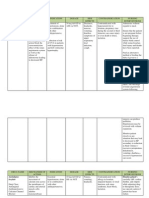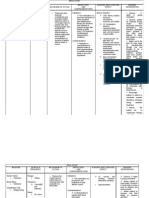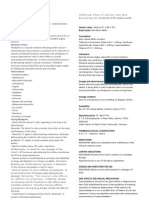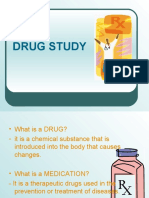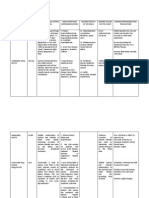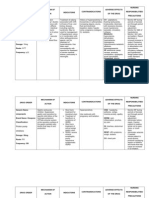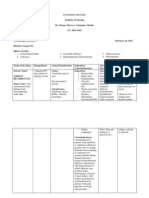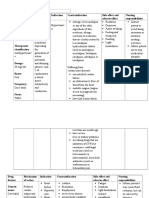Emergency Drugs
Emergency Drugs
Uploaded by
Arra PlacidesCopyright:
Available Formats
Emergency Drugs
Emergency Drugs
Uploaded by
Arra PlacidesCopyright
Available Formats
Share this document
Did you find this document useful?
Is this content inappropriate?
Copyright:
Available Formats
Emergency Drugs
Emergency Drugs
Uploaded by
Arra PlacidesCopyright:
Available Formats
Generic/ Brand Name/ Drug Classification Generic Name: Captopril Classification: ACE Inhibitor
Route of administratio n, Stock Dose Route: Oral Stock dose in tablet form: 12.5mg, 25mg, 50mg, 100mg
Mechanisms of Action
Indications
Adverse Effects/ Contraindications
Nursing Responsibilities Monitor patients blood pressure and pulse rate frequently. Assess patient for signs of angioedema. Instruct patient to take drug 1 hour before meals; food in the GI tract may reduce absorption. Inform patient that light-headedness is possible.
Inhibits ACE, preventing conversion of angiotensin I to angiotensin II, a potent vasoconstrictor. Less angiotensin II decreases peripheral arterial resistance, decreasing aldosterone secretion, which reduces sodium and water retention and lowers blood pressure.
Indicated for: Hypertension, Diabetic Neuropathy, Heart Failure, Left ventricular dysfunction after acute MI.
Adverse effects: Angioedema, dry persistent nonproductive cough, leukopenia, pancytopenia, headache, hypotension Contraindicated to patients hypersensitive to drug or other ACE inhibitors. Use of drug during pregnancy can cause injury and death to developing fetus. Use cautiously in patients with impaired renal function or serious immune disease.
Generic Name: Potassium Chloride Classification: Potassium Salt (Electrolyte balancing drug)
Route: Oral TIV by incorporation to IV fluids. Never via IV push or IM! Stock dose: Capsules: 8 mEq, 10mEq Oral liquid: 20mEq/15ml, 40mEq/15ml Tablets: 8 mEq, 10mEq, 15 mEq, 20mEq
Replaces potassium and maintains potassium level.
: To prevent hypokalemia, Hypokalemia, Severe hypokalemia
Adverse effects: Arrhythmias, heart block, cardiac arrest, hyperkalemia, respiratory paralysis Use cautiously in patients with renal impairment or cardiac disease. Contraindicated in patients with severe renal impairment with oliguria, anuria, or azotemia.
Monitor ECG and electrolyte levels during therapy. Monitor renal function. Teach patient signs and symptoms of hyperkalemia, and tell patient to notify prescriber if they occur.
Generic Name: Mannitol Classification: Osmotic Diuretic
Route: TIV Stock dose: Injection: 5%, 10%, 15%, 20%, 25%
Increases osmotic pressure of glomerular filtrate, thus inhibiting tubular reabsorption of water and electrolytes. Drug elevates plasma osmolality and increases water flow into
Test dose for marked oliguria or suspected inadequate renal function Oliguria To prevent oliguria or acute renal failure
Adverse effects: Sezures, heart failure, dizziness, diarrhea, chill, dehydration. Contraindicated in patients hypersensitive to drug.
Monitor vital signs, including central venous pressure and fluid intake and output hourly. Report increasing oliguria. Check weight, renal function, fluid
extracellular fluid. To reduce intraocular or intracranial pressure or cerebral edema Diuresis in drug intoxication Irrigating solution during transurethral resection of prostate gland Indicated for: Symptomatic GERD without esophageal lesions Erosive esophagitis and accompanying symptoms caused by GERD Maintenance of healing erosive esophagitis Frequent heartburn Short-term treatment of active benign gastric ulcer
Contraindicated in patients with anuria; previous progressive heart failure or pulmonary congestion after drugs.
balance, and serum and urine sodium and potassium levels daily. Tell patient that he may feel thirsty or have a dry mouth, and emphasize importance of drinking only the amount of fluids ordered.
Generic Name: Omeprazole Classification: Proton Pump Inhibitor
Route: Oral TIV Stock dose: Capsules: 10mg, 20mg, 40mg Powder for oral suspension: 20mg/packet, 40mg/packet
Inhibits proton pump activity by binding to hydrogenpotassium adenosine triphosphatase, located at secretory surface of gastric parietal cells, to suppress gastric acid secretion.
Adverse effects: Dizziness, abdominal pain, back pain, cough, upper respiratory tract infection, rash. Contraindicated to patients hypersensitive to drug or its component.
Tell patient to swallow tablets or capsules whole not to crush or chew them. Instruct patient to take drugs 30minutes before meals. Caution patient to avoid hazardous activities if he gets dizzy. Because drug can interfere with Vit.
Generic Name: Dextran Classification: Anti-coagulants/ Anti-thrombotics
Route: TIV Stock dose: 10% solution in D5W or NS
Dextrans produce expansion of plasma volume. It also reduces blood viscosity and inhibits sludging or aggregation of red blood cells.
This medication is an anticoagulant, prescribed for hypovolaemic shock, thromboembolic disorders, pulmonary embolism, venous thrombosis and prophylaxis of post-op thromboembolic disorders.
Adverse effects: GI disturbances; headache, dizziness; allergic reactions; raised liver enzyme values; alopecia; bone marrow suppression. Contraindicated to patients hypersensitivite to it. Patients with severe renal disease Patients withwith oliguria or anuria. Patients with marked cardiac decompensation. Women who are Pregnancy.
B12 absorption. Monitor for macrocytic anemia Evaluate patient's state of hydration before dextran therapy begins. Administration to severely dehydrated patients can result in renal failure. Observe for S&S of circulatory overload Report oliguria, anuria, or lack of improvement in urinary output (dextran usually causes an increase in urinary output). Discontinue dextran at first sign of renal dysfunction. Report immediately S&S of bleeding: easy bruising, blood in urine or dark tarry stool.
You might also like
- Clinical Medication ListDocument181 pagesClinical Medication Listsophia onu100% (2)
- Naplex Complete Study Outline A Topic-Wise Approach DiabetesFrom EverandNaplex Complete Study Outline A Topic-Wise Approach DiabetesRating: 4 out of 5 stars4/5 (3)
- CVA Drug StudyDocument51 pagesCVA Drug StudyKarel LuNo ratings yet
- Final Drug StudyDocument22 pagesFinal Drug StudyPaula Xavier AlfalahiNo ratings yet
- FINAL Drug StudyDocument9 pagesFINAL Drug StudyKristen Leigh MarianoNo ratings yet
- DrugsDocument7 pagesDrugsEloisa Abarintos RacalNo ratings yet
- 13 Drug StudyDocument6 pages13 Drug StudyRachel Yvonne Cabacungan100% (1)
- Drug Study GuideDocument9 pagesDrug Study GuideSh3meeNo ratings yet
- Drug StudyDocument8 pagesDrug StudyJheryck SabadaoNo ratings yet
- Labs Drug Study 1Document17 pagesLabs Drug Study 1Drei LanuzoNo ratings yet
- Spironolactone: Generic Name Brand Name ClassificationDocument5 pagesSpironolactone: Generic Name Brand Name ClassificationShermalyn SalahuddinNo ratings yet
- MM MM MM MM MMM MMMMM M MM M MMMM MMMMM MMM MM MMM MM!M M!"M#MM MM M $M M %MMM MM "M "MM M MMM MDocument9 pagesMM MM MM MM MMM MMMMM M MM M MMMM MMMMM MMM MM MMM MM!M M!"M#MM MM M $M M %MMM MM "M "MM M MMM M배기숭No ratings yet
- Drug StudyDocument10 pagesDrug StudyHelen ReonalNo ratings yet
- Drug Study: Francisco Tampos JRDocument37 pagesDrug Study: Francisco Tampos JRCarlmeister Ambray JudillaNo ratings yet
- Case Pres PREECLAMPSIA Drugs NCPDocument12 pagesCase Pres PREECLAMPSIA Drugs NCPDanica May Galvez100% (1)
- Emergency Drugs KathDocument29 pagesEmergency Drugs Kathmajin655No ratings yet
- Drug StudyDocument3 pagesDrug Studyanon_11638632No ratings yet
- Drug StudyDocument22 pagesDrug StudyColleen Fretzie Laguardia NavarroNo ratings yet
- Generic Name Captopril Brand NamesDocument18 pagesGeneric Name Captopril Brand NamesAiko Villacortes100% (1)
- VIII. Drug StudyDocument11 pagesVIII. Drug StudyCharlayne AnneNo ratings yet
- Drugs For Substances AbuseDocument4 pagesDrugs For Substances AbuseAriadne MangondatoNo ratings yet
- Drug StudyDocument28 pagesDrug StudyJheryck SabadaoNo ratings yet
- Drug StudyDocument14 pagesDrug StudyKatrina EstoconingNo ratings yet
- Drug StudyDocument9 pagesDrug StudyOdarp PradzNo ratings yet
- Ix. Pharmacologic Management Brand Name Classification Indication Mechanism of Action Dosage and Frequency Adverse Reactions Nursing ConsiderationDocument21 pagesIx. Pharmacologic Management Brand Name Classification Indication Mechanism of Action Dosage and Frequency Adverse Reactions Nursing ConsiderationDizerine Mirafuentes RolidaNo ratings yet
- Drug Name Dose, Route, Frequency Mechanism of Drug Indications Adverse Effects Contraindications Nursing ResponsibilitiesDocument15 pagesDrug Name Dose, Route, Frequency Mechanism of Drug Indications Adverse Effects Contraindications Nursing ResponsibilitiesitsmechachaNo ratings yet
- Drug StudyDocument6 pagesDrug StudyMaurence John Feliciano LuluquisenNo ratings yet
- Drug Study For TetanusDocument10 pagesDrug Study For TetanusMei PayumoNo ratings yet
- Drug StudyDocument12 pagesDrug StudyCamilley De Vera100% (1)
- Drug StudyDocument10 pagesDrug StudyFranco ObedozaNo ratings yet
- Drug StudyDocument96 pagesDrug StudyirismirzigNo ratings yet
- Drug Study Feu NRMF IcuDocument9 pagesDrug Study Feu NRMF IcuAnne Genesis V. PinedaNo ratings yet
- Drug OrderDocument4 pagesDrug OrderVic MagtotoNo ratings yet
- Medication Brand Name and Generic NameDocument12 pagesMedication Brand Name and Generic Namexaliokoli127No ratings yet
- Drug Study 68-75Document8 pagesDrug Study 68-75joshua_santiago_5No ratings yet
- Brand Names: Generic NameDocument3 pagesBrand Names: Generic NameEzraManzanoNo ratings yet
- ACE Inhibitors PrintDocument5 pagesACE Inhibitors PrintBernard TangNo ratings yet
- 11. Antihypertensive Part 1Document32 pages11. Antihypertensive Part 1bartssagunNo ratings yet
- DrugsDocument20 pagesDrugsLee Won100% (1)
- Far Eastern University Drug StudyDocument14 pagesFar Eastern University Drug StudyteeteevoyzNo ratings yet
- Drug StudyDocument19 pagesDrug StudyLovely EsguerraNo ratings yet
- Drugs - Icu (Group)Document7 pagesDrugs - Icu (Group)Patricia LuceroNo ratings yet
- Nephrolithiasis - Drug StudyDocument5 pagesNephrolithiasis - Drug StudyAia JavierNo ratings yet
- Drug StudyDocument9 pagesDrug StudyrocketwapNo ratings yet
- Meds Affecting Blood PressureDocument5 pagesMeds Affecting Blood PressuremikiNo ratings yet
- Drug StudyDocument3 pagesDrug StudyGail SantosNo ratings yet
- Drug Study HydralazineDocument10 pagesDrug Study HydralazineLuige AvilaNo ratings yet
- Common MedicationsDocument12 pagesCommon MedicationsJasmeen KaurNo ratings yet
- Drugs Used in Cardio Vascular SystemDocument138 pagesDrugs Used in Cardio Vascular SystemSagun lohalaNo ratings yet
- Drug Dosage Mechanism of Action Specific Indication Contraindicati ON Adverse Effect Nursing PrecautionDocument11 pagesDrug Dosage Mechanism of Action Specific Indication Contraindicati ON Adverse Effect Nursing PrecautionIzabela UyNo ratings yet
- Drug StudyDocument23 pagesDrug StudyJoyce Anne SupnetNo ratings yet
- Antihypertensive Pharmacologic Agents: Nr33 K Burger, Msed, MSN, RN, CneDocument28 pagesAntihypertensive Pharmacologic Agents: Nr33 K Burger, Msed, MSN, RN, CneLopez JoeNo ratings yet
- Drug Study For End Stage Renal DiseaseDocument16 pagesDrug Study For End Stage Renal Diseaselenecarglbn100% (1)
- Drug StudyDocument7 pagesDrug StudyMan GatuankoNo ratings yet
- Drugs Coronary Ward IIDocument7 pagesDrugs Coronary Ward IITimothy Joy VercelesNo ratings yet
- Critical Care Medications: Anti-Arrhythmics Study Guide: Critical Care EssentialsFrom EverandCritical Care Medications: Anti-Arrhythmics Study Guide: Critical Care EssentialsNo ratings yet
- Diabetes and Heart Health: Understanding Medications and Natural Reversal StrategiesFrom EverandDiabetes and Heart Health: Understanding Medications and Natural Reversal StrategiesNo ratings yet
- Hepatorenal Syndrome, A Simple Guide To The Condition, Diagnosis, Treatment And Related ConditionsFrom EverandHepatorenal Syndrome, A Simple Guide To The Condition, Diagnosis, Treatment And Related ConditionsNo ratings yet
- Top 100 Drugs Pocket Reference Guide (2023 Edition)From EverandTop 100 Drugs Pocket Reference Guide (2023 Edition)No ratings yet
- Special EducationDocument4 pagesSpecial EducationArgie Cayabyab CagunotNo ratings yet
- Complication of Enteral Nutrition PDFDocument3 pagesComplication of Enteral Nutrition PDFIndra WijayaNo ratings yet
- OFLOX-OZ TabletsDocument30 pagesOFLOX-OZ TabletsSilvio BarbosaNo ratings yet
- Influenza: What We Know: Mohammad Nuriman Bin Mohd Zainuddin (Aa0890) Lablink, KPJ Puteri Specialist HospitalDocument24 pagesInfluenza: What We Know: Mohammad Nuriman Bin Mohd Zainuddin (Aa0890) Lablink, KPJ Puteri Specialist Hospitaliman zainuddinNo ratings yet
- Medical Errors Must Be Reduced For The Welfare of The Global Health SectorDocument11 pagesMedical Errors Must Be Reduced For The Welfare of The Global Health SectorNurul Pratiwi UsmanNo ratings yet
- Miscarriage and Its Types: Farhad Ali 15 - 177 3 Year MBBSDocument21 pagesMiscarriage and Its Types: Farhad Ali 15 - 177 3 Year MBBSmarviNo ratings yet
- Penicillins: Presented By, DR Noor JahanDocument58 pagesPenicillins: Presented By, DR Noor JahanSally PujaNo ratings yet
- Stroke and Dementia: Dr. Dr. Suherman, SP.S (K)Document36 pagesStroke and Dementia: Dr. Dr. Suherman, SP.S (K)deri rivanoNo ratings yet
- Acute Gastroenteritis (AGE) : A Case Study ONDocument28 pagesAcute Gastroenteritis (AGE) : A Case Study ONCedy L. CieloNo ratings yet
- Human Disease PDFDocument7 pagesHuman Disease PDFAyush MishraNo ratings yet
- Pediatrics Nursing DisordersDocument9 pagesPediatrics Nursing DisordersAli IgnacioNo ratings yet
- Stigma and Discrimination LessonDocument13 pagesStigma and Discrimination LessonNurul FurqoniyahNo ratings yet
- Rabat University Faculty of Nursing Science Epidemiology Exam. Batch 12 Time Two HoursDocument8 pagesRabat University Faculty of Nursing Science Epidemiology Exam. Batch 12 Time Two Hoursعمر مزاحم100% (1)
- Aortic StenosisDocument8 pagesAortic Stenosisdr.moni.co.ukNo ratings yet
- Laporan Kegiatan Dan Reimbursement Biaya Pengurusan Visa AustraliaDocument5 pagesLaporan Kegiatan Dan Reimbursement Biaya Pengurusan Visa AustraliamemekbecekNo ratings yet
- Serenace PDFDocument5 pagesSerenace PDFSundarNo ratings yet
- Epidemiology NotesDocument16 pagesEpidemiology NotesAnonymous 1I0JCC96G2100% (1)
- NFD International Manning Vs IllescasDocument1 pageNFD International Manning Vs IllescasEarl LarroderNo ratings yet
- Journal ReadingDocument2 pagesJournal ReadingMark Ianne AngNo ratings yet
- Seventh House: The MarriageDocument3 pagesSeventh House: The MarriageRahul DubaiNo ratings yet
- Malabsorption SyndromeDocument15 pagesMalabsorption SyndromeGarima SrivastavaNo ratings yet
- Neurology Past Years Before EhsanDocument345 pagesNeurology Past Years Before EhsanMohammad AlrefaiNo ratings yet
- Types of Disorder, Its Cause & Nature (Adhd, SPD, Asd, Odd, Ocd)Document16 pagesTypes of Disorder, Its Cause & Nature (Adhd, SPD, Asd, Odd, Ocd)riha mogNo ratings yet
- Food AllergyDocument20 pagesFood AllergyNeaNo ratings yet
- ANA 202 Wks 1 and 2Document62 pagesANA 202 Wks 1 and 2ayomideolaniran14No ratings yet
- ICUDocument76 pagesICUMichael Niel Bulatao100% (1)
- CMSE Question PapersDocument285 pagesCMSE Question PapersHari WaranNo ratings yet
- PCOS GP Tool 20180815 Henry, Dr.Document4 pagesPCOS GP Tool 20180815 Henry, Dr.Mitaa CikawaiNo ratings yet
- CH 20, Nursing Care of A Family Experiencing A Pregnancy ComplicationDocument17 pagesCH 20, Nursing Care of A Family Experiencing A Pregnancy Complicationcutiepie creampieNo ratings yet
- READING Practice 2Document15 pagesREADING Practice 2Matilda El HageNo ratings yet





